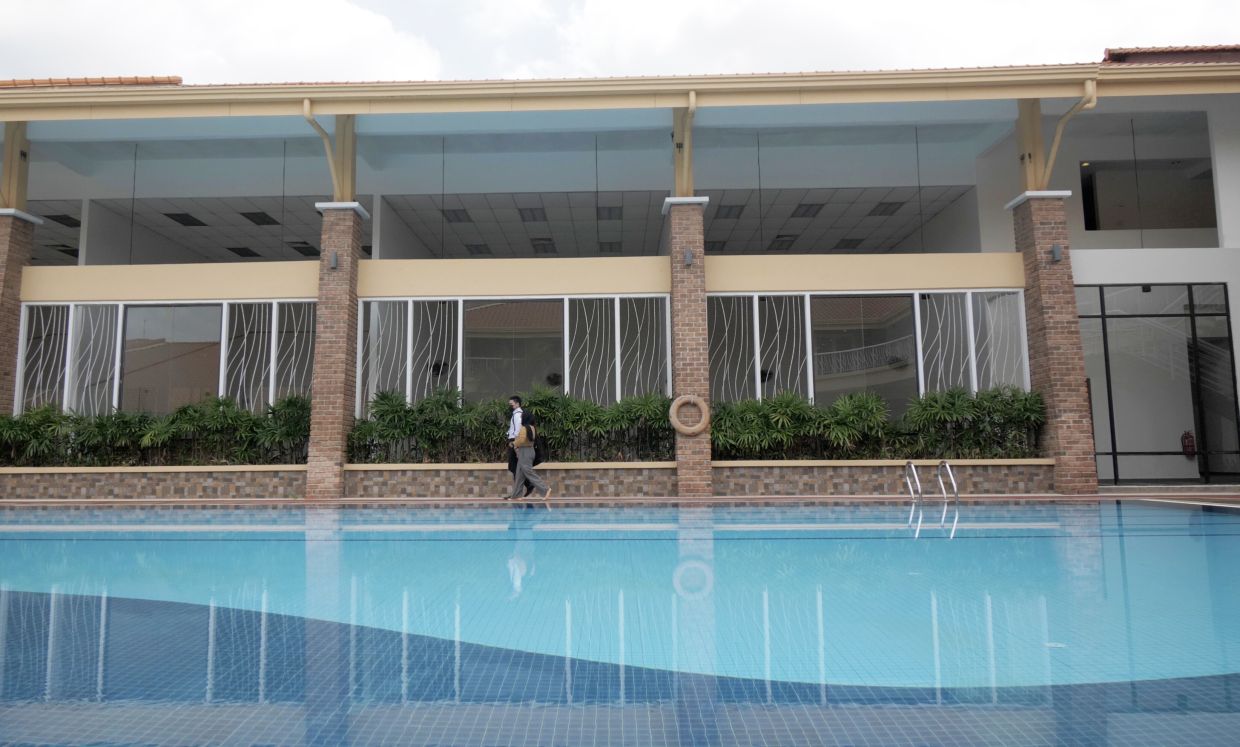Developments in the neurosurgical field have enabled safer and less intrusive treatments for brain tumours.
WHEN faced with the possibility of brain surgery, the first emotion we would likely experience is instinctual unease. This is a natural reaction as our personalities, thoughts and other aspects that define us are inextricably linked to brain function. The thought of having our identities being permanently altered can be unsettling.
Fortunately, it is a big misconception that neurosurgical intervention causes sudden personality shifts. The reality is that these drastic changes are more often associated with brain tumours. If left untreated, it carries more severe risks and consequences compared to the relatively low risk of surgery.
Moreover, the field of neurosurgery in Malaysia has made significant advancements in both surgical technique and medical technology, further reducing risk associated with neurosurgical procedures, while enabling more precise and effective treatment.
It is important for Malaysians to develop better understanding of brain tumours and available treatments to help them make more informed decisions and protect the health of both themselves and their loved ones.
Who is at risk?
Brain tumours can affect anyone regardless of age or lifestyle and its effects can range from being relatively benign to potentially life-threatening depending on its size, location and development. The cause for primary tumour growths that originate from the brain is still unknown.
It is generally advisable that individuals undergo an MRI scan if they experience clinical symptoms as described in this article, although this can vary depending on the patient’s condition and situation. Patients with cancer are also more likely to develop secondary brain tumours (caused by the spread of cancer cells from other body organs). An oncologist will recommend these patients undergo serial MRI screenings once every three to six months.
Common symptoms
One of the tell-tale signs of a brain tumour is persistent and severe headaches, especially if the headaches get
progressively worse over time. A sudden change in headache intensity and pattern could also be indicative of a brain tumour but not all headaches are indicative of a tumour.
Other symptoms of brain tumours include an unsteady gait, blurred vision and vomiting. Unfortunately, these symptoms can sometimes be overlooked and mistakenly attributed to other comorbidities, causing brain tumours to remain undiagnosed for many years.
Interventional pain specialist, neurosurgery and spine surgery expert at Sunway Medical Centre, Sunway City, Dr Toh Charng Jeng emphasises the subtle nature of brain tumours and the potential difficulties in identifying them.
“It is common for older patients, for example, to miss signs of brain tumours. They generally have their attention slowed down and maybe talk less than before. Some may think this is just a part of dementia.”
“Patients must always consult a neurologist before jumping to conclusions. You shouldn’t assume psychiatric illness until you rule out red-flag conditions like tumours, especially if their symptoms do not present themselves as typical dementia signs, for example, as it would need to be investigated further.”
Given the difficulty of noticing personal behavioural changes in oneself, we must rely on our loved ones to notice unusual or persistent changes in our attitudes and recommend medical consultations.
Advancement in technology
Thanks to many advancements in the field of neurosurgery over the decades, surgical procedures on brains have become exceedingly safe. The integration of image guidance, imaging dyes and microscope enhancements are great examples of assistive technology and play a key role in enabling surgeons to perform surgeries with improved precision and consistency.
Dr Toh says: “Patients must always consult a neurosurgeon before jumping to conclusions.”
Dr Toh adds, “The advancement of technology is to assist neurosurgeons in treatment. Thanks to assistive machinery, a surgeon’s work has become more consistent. For example, technology has enabled neurosurgeons to take advantage of intraoperative neurophysiology monitoring, which allows surgeons to monitor nerves while performing surgery. This helps with avoiding injury to the nerve as the machine can warn us earlier.”
Other techniques and technology include the ultrasonic aspirator that breaks brain tumours into smaller pieces to be extracted even with small craniotomy opening (keyhole neurosurgery) and the awake craniotomy that keeps the patient awake during surgery to give real-time essential feedback which further reduce the risk of surgery.
There is also the gamma knife (GK), a very powerful, precise and least collateral radiosurgery machine used today and developed by neurosurgeon Lars Leksell in 1967 specifically for cranial pathology. Advancements in cancer treatment have improved survival rates in cancer patients with increased incidences of brain metastasis; but with the GK, cancer tumours can be controlled or reduced dramatically, translating to more improved survivals for patients with stage four brain metastasis. It is also useful when surgical risk is too high for a small tumour situated deep in the brain.
Given the individualistic nature of the human brain as well as tumour development, neurosurgical interventions are typically tailor-made for each patient. Patients can rest easy as doctors guide them through all available treatment options and recommended procedures, empowering them to make a decision that is most suited for their condition.
Overall, the notion that brain surgery is dangerous is largely misconstrued as rapid improvement in neurosurgical techniques and technology alongside the dedication of neurosurgeons, surgery risk has been drastically reduced, enabling former brain tumour patients to continue living long and fulfilling lives.
For more information, call 03-7491 9191 or Whatsapp 012-635 0113.
Dr Toh Charny Jeng
Dr Toh Charng Jeng - Interventional Pain Specialist .
Assoc. Prof. Dr. Toh Charng Jeng - Secretariat of ...
Dr. Toh Charng Jeng;杜长征
Dr. Toh Charng Jeng
Source link
Keeping the mind active
ACCORDING to the World Health Organization (WHO), approximately 70% of the global burden of neurological and neurodevelopmental conditions affects low- and middle-income countries. Neurological conditions are the leading cause of disability and the second leading cause of death in the world with nine million deaths annually. Stroke, migraine, dementia, meningitis and epilepsy are the top five contributors to neurological disabilities globally. With an increasing ageing population, Alzheimer’s and Parkinson’s disease are also becoming more significant.
According to medical director and consultant neurosurgeon Prof Dr Badrisyah Idris at MSU Medical Centre, “The brain is a unique organ with three important functions that affect our lives which are, sensory interpretation and movement control; cognitive, mental and emotional integrity; and behaviour and social execution.”
Brain health is becoming an important concept in healthy living which encompasses the ability of the brain to rewire in life in response to changes in experience and environment. A healthy brain is capable of slowing down cognitive decline and combating any injury or diseases of the brain. There are several things that we can make a habit to maintain our brain health.
Regular physical activity can benefit the brain by optimising the brain’s blood flow and reducing the loss of brain cells during ageing. Those who exercise regularly can enjoy healthy cognitive abilities and have a lower risk of developing dementia. Exercise helps to lower blood pressure reducing cardiovascular risks of getting a stroke. Some studies have found that regular exercise increases the level of a protein that promotes the growth and maintenance of brain cells. Having an active lifestyle such as taking the stairs, engaging in sports or hobbies or having purposeful exercise such as brisk walking or aerobic training can have a positive impact on brain health.
Quality sleep is important for brain healing and the restoration of mental function. Sleep makes our thinking processes sharp and focused with better decision-making. Seven to eight hours of sleep gives the brain adequate time to clear abnormal proteins that accelerate dementia. Several lifestyle measures can be adopted to ensure no alteration in sleep patterns such as increasing time in the sunlight, consistent sleep routines and being aware of the effects of medications.
The brain is only 2% of the body weight yet it consumes 20% of energy requirements. Without the right energy and nutrients, the brain will start losing its function. Food rich with antioxidants (compounds that have a protective effect on the brain), fibre, unsaturated fats (including omega-3 fatty acids), B vitamins and an adequate amount of complex carbohydrates is important to maintain a healthy brain. A diet rich in processed foods, salt and refined sugars can increase inflammation and free radicals in our body that can negatively impact brain health.
“The brain is a unique organ with three important functions that affect our lives which are, sensory interpretation and movement control; cognitive, mental and emotional integrity; and behaviour and social execution.” -Prof Dr Badrisyah Idris
Cognitive stimulation by learning new skills or knowledge helps the brain to become constantly healthy with the formation of new circuits between brain cells. Challenging the brain increases its cognitive reserve by creating an adequate backup system. With more reserves, the brain can become more resistant to changes that are associated with neurodegenerative diseases. Education and learning enhance the cognitive reserve which makes the brain less susceptible to the effects of age and brainrelated changes.
Depression and anxiety can be detrimental to brain health with their effects on mood and emotion. These conditions lead to slow thinking, memory and concentration difficulties. Social connectivity helps to get rid of depression and anxiety. Socialising helps the brain expand its cognitive reserve. Engaging in conversation trains the brain to increase attention and concentration, and helps social judgement. Therefore, it is important to stay connected with friends and families to maintain healthy brain functions.
Neurosurgery
Prof. Dr Badrisyah Bin Idris
Consultant Neurosurgeon| Speciality |
: |
Neurosurgery |
| Clinic |
: |
Level 3 |
| Language (s) |
: |
Bahasa Malaysia, English |
| MMC Number |
: |
39433 |
| NSR Number |
: |
130127 |

CERTIFICATION AND QUALIFICATION
- MBBChBAO (National University of Ireland Galway, Ireland)
- Associate Fellow Royal College of Surgeons in Ireland (Dublin, Ireland)
- Master in Surgery (Neurosurgery)(USM)
- Commonwealth Executive MBA (WOU)
- CMIA (NIOSH)Fellowship in Neurosurgical Oncology and Surgical Epileptology (Dublin, Ireland)
- Fellowship in Pain and Spine Intervention (New Delhi, India)
CONSULTANT CLINIC HOURS
- Monday - Friday : 8.30 am - 5.30 pm
- Saturday : 8.30 am - 12.30 pm
Related posts:
KEEPING ACTIVE FOR BETTER COGNITION: Sharpening the mind, Feeling better with ginkgo biloba












 .
.
